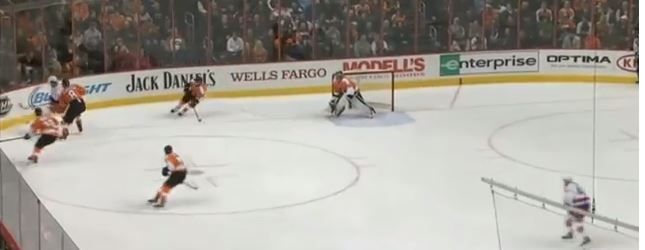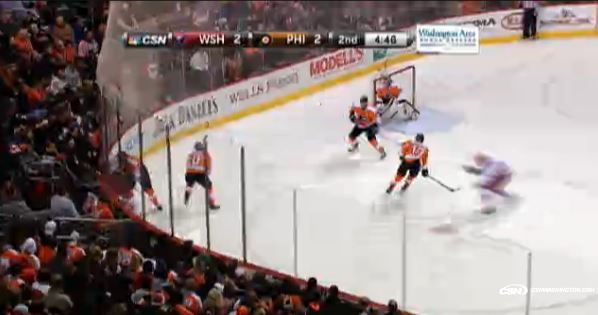Follow Paul on Twitter: @paulstewart22
The National Hockey League has held a phone hearing for Washington Capitals winger Tom Wilson. The League has decided not to suspend the player as a result of an incident in the second period of Washington's game on Tuesday against the Philadelphia Flyers.
On the play, Wilson received a charging major and game misconduct after sending Philadelphia center Brayden Schenn flying heavily into the end boards with a freight train bodycheck. Schenn had difficulty getting back to the bench and did not return to the game, although he reportedly was not concussed.
First let's look at the play. Then we will discuss the penalties that were called.
Here is video of the play at full speed:
Here is a still shot of where Wilson was when he first locked in on Schenn as a potential bodycheck target and starts to make a beeline for his opponent:

Here's a still of roughly the point where Wilson starts to hit full acceleration:

After this point, Schenn adds to his own vulnerability by starting to turn toward the boards. The hit is delivered from the side and Schenn careens heavily into the wall.
So what do we have here? Frankly, it's a despicable kamikaze attack, not a check at all. There was no intent to separate Schenn from the puck. The intent was to separate Schenn's body in half.
Let's start with the Rulebook legalities here. This is how the NHL Rulebook (Rule 42.1) defines charging, with relevant portions highlighted:
A minor or major penalty shall be imposed on a player who skates or jumps into, or charges an opponent in any manner.
Charging shall mean the actions of a player who, as a result of distance traveled, shall violently check an opponent in any manner. A “charge” may be the result of a check into the boards, into the goal frame or in open ice.
A major penalty was called at the discretion of referees Chris Rooney and Mike Leggo, based upon the violence of the hit (Rule 42.3). The Rulebook also states that if a major penalty is called and the recipient of the hit suffers an apparent head or facial injury, a game misconduct must also be imposed (Rule 42.5).
This incident is about as clear cut as a charging penalty gets. The onus is on the player delivering check to make sure his opponent is not in a vulnerable or defenseless position. If he is, the checker MUST try to avoid or at least minimize the contact. None of that happened here.
Let me add this: The Washington Capitals' response -- from both head coach Adam Oates and general manager George McPhee -- is a perfect illustration of teams' sense of entitlement to the "29-Team Rulebook" that I have mentioned in several previous blogs.
Oates' assertion that the hit was clean and Wilson took only "two quick strides" on the play was so laughable that even that even the infamous Iraqi Information Minister would have a good chuckle about it... or maybe jotted down some notes on how Oates actually managed to say that with a straight face.
Wilson came from a great distance to deliver this hit, and made no effort whatsoever to slow down. It was a no-brainer charging penalty, and I feel mighty comfortable saying that if a Capitals player had been hit with the very same check with the same result, Oates and McPhee would have been livid (and rightfully so) if no penalty was called.
Oates did not feel that a game misconduct was warranted? Hell, he should be glad that Chris and Mike gave his player the benefit of the doubt on whether there was intent to injure and a match penalty warranted (Rule 42.4). The fact that Schenn put himself into a more vulnerable position probably weighed into this decision.
Have you ever heard of something called a red herring? That's when someone tries to divert attention from the real issue at hand by presenting plausible -- but irrelevant -- information.
Oates keeps bringing up the fact that Schenn was at first facing Wilson and then turned toward the boards. He also mentions that the hit was delivered from the side and not from behind.
All of this is accurate, but it's a red herring. The player was
not penalized for boarding or checking from behind. He was penalized for charging, which has nothing to do with how the hit was delivered or whether the other player put himself in a vulnerable position. It has to do with distance traveled and violence of the hit. To deliver this check, Wilson damn near traveled from Fishtown to the goal line of the arena in South Philly.
Incidentally, to those saying "Well, Wilson didn't leave his feet", a player need not jump into a check for charging to apply. That is just one possible scenario for charging.
In past blogs, apart from the written Rulebook, I have made reference to what I call the Udvari Rule of Refereeing as well as the Humanitarian Rulebook. The Udvari Rule is this: If you were playing in the game and someone did the same thing to your teammate, would it anger you? If so, it's probably a penalty.
The Humanitarian Rulebook is a moral compass. Basically it means showing a conscience and respecting the game and the safety of fellow players. Hint: Making a beeline from the blueline in to deliver a predatory hit is NEVER a clean play.
The discussion over whether Schenn put himself into unnecessary jeopardy is a separate debate. Yes, the player should have done a better job of self-protection here. That has nothing to do with Wilson's actions.
As for McPhee and Oates calling the play a "great hit" and having their first reaction to be professing how sorry they feel for Wilson because he was penalized -- with little to no expression of concern about whether a player got seriously injury -- is disgusting. However, it is hardly unique to the Washington Capitals.
Pretty much every team is guilty of that to varying degrees. The Caps' staunch criticism of the penalty that was called here is just an underscored, all-caps (no pun intended) version of the 29-Team Self-Entitlement Rulebook in action.
Wilson gets nabbed for charging? Talk about why he didn't deserve a boarding penalty. Blame the hit recipient (who had little to no chance of avoiding that hit). Change the facts of the play. Direct the attention to whether a Philadelphia player should have gotten an instigator penalty for confronting and fighting Wilson a few seconds later.
On a related note, my colleagues here in the KHL tell me that red herrings are delicious on a plate with blinis and smoked salmon.
************
Recent Blogs by Paul Stewart
Working With Injury
Coach Accountability and the Engelland Incident
Linesman Appreciation Day: From Thor to Bob's Big Boy to 42nd St. Cops
NHL Officials: Americans Still Have a Hard Time Being Hired
Crisp Thoughts
Olympic Officials: Jeux San Frontieres?
Thornton Went After the Wrong Guy
************
Paul Stewart holds the distinction of being the first U.S.-born citizen to make it to the NHL as both a player and referee. On March 15, 2003, he became the only American-born referee to officiate in 1,000 NHL games.
Today, Stewart is an officiating and league discipline consultant for the Kontinental Hockey League (KHL) and serves as director of hockey officiating for the Eastern College Athletic Conference (ECAC).
The longtime referee heads Officiating by Stewart, a consulting, training and evaluation service for officials, while also maintaining a busy schedule as a public speaker, fund raiser and master-of-ceremonies for a host of private, corporate and public events. As a non-hockey venture, he is the owner of Lest We Forget.
Stewart is currently working with a co-author on an autobiography.

